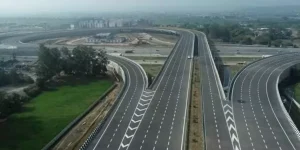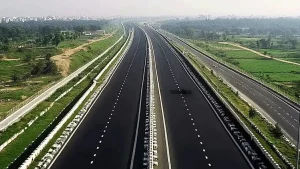The Shaktipeeth Expressway protests have emerged as one of Maharashtra’s most significant agricultural movements in recent years, with farmers from 12 districts uniting against the ambitious Rs 86,300 crore infrastructure project. The proposed 802-kilometre expressway connecting Nagpur to Goa has triggered widespread opposition from agricultural communities who fear that massive land acquisition will destroy their livelihoods and fertile farmland.
The Shaktipeeth Expressway protests gained momentum when farmers realised the project would require extensive land acquisition across multiple districts, potentially displacing thousands of agricultural families. The Maharashtra government’s ambitious infrastructure plan, designed to reduce travel time from 13 hours to 8 hours between Nagpur and Goa, has instead become a flashpoint for farmer-government tensions.

Also Read: Shaktipeeth Expressway
Shaktipeeth Expressway protests
have spread across 12 districts in western Maharashtra and Marathwada, demonstrating the project’s far-reaching impact on agricultural communities. Farmers have unanimously declared that government officials will not be permitted to enter their lands for measurement and acquisition purposes, effectively blocking the project’s initial surveying phase.
During recent demonstrations, thousands of farmers gathered at Mumbai’s Azad Maidan to voice their opposition, marking one of the largest agricultural protests in the state’s recent history. The Shaktipeeth Expressway protests have transcended regional boundaries, with farmers from Sangli, Satara, Kolhapur, Sindhudurg, and other affected districts joining forces to resist the project.
The protesters have employed various tactics, including blocking national highways, organising massive rallies, and creating human chains to prevent government surveyors from accessing agricultural lands. These Shaktipeeth Expressway protests have severely disrupted traffic in several regions, with some demonstrations lasting over an hour and affecting interstate connectivity.
Former Member of Parliament Raju Shetty has emerged as a prominent leader in the Shaktipeeth Expressway protests, heading the Shaktipeeth Highway Struggle Committee. Shetty has made emotional appeals to residents, particularly in Sindhudurg, declaring his willingness to “fight till the last drop of blood” to ensure the project’s cancellation.
The Shaktipeeth Expressway protests have garnered support from multiple political parties, including the Nationalist Congress Party (NCP) and Congress, who have voiced strong opposition to the project. Political leaders argue that the expressway represents a “Swarthpeeth” (selfish project) rather than the promised “Shaktipeeth” (power centre), claiming it will burden the state with enormous debt.
Shetty’s Swabhimani Shetkari Sanghatana has been at the forefront of organising the Shaktipeeth Expressway protests, mobilising farmers across affected districts and coordinating resistance efforts. The organisation has emphasised that their struggle is not political but focused on protecting farmers’ rights and preserving agricultural land.
The Shaktipeeth Expressway protests have highlighted significant environmental concerns, with activists arguing that the project will destroy fertile agricultural land and disrupt natural water sources. Farmers contend that the expressway will pass through highly productive farmland, potentially affecting food security and agricultural productivity in the region.
Economic arguments against the project have intensified the Shaktipeeth Expressway protests, with critics questioning the state’s ability to bear the massive financial burden. Initial estimates suggest the project cost could escalate to Rs 1.5 lakh crore, given the Maharashtra government’s track record of cost overruns in infrastructure projects.
The Shaktipeeth Expressway protests have also raised concerns about the project’s impact on local ecosystems, particularly in hilly regions where tunnelling would be required. Farmers argue that such construction activities could deplete natural water sources and affect agricultural irrigation systems.
 Despite the widespread Shaktipeeth Expressway protests, Chief Minister Devendra Fadnavis has maintained a firm stance on the project, emphasising its importance for state development and connectivity. The government argues that the expressway will boost tourism, especially religious tourism, and enhance economic opportunities across the region.
Despite the widespread Shaktipeeth Expressway protests, Chief Minister Devendra Fadnavis has maintained a firm stance on the project, emphasising its importance for state development and connectivity. The government argues that the expressway will boost tourism, especially religious tourism, and enhance economic opportunities across the region.
However, the intensity of the Shaktipeeth Expressway protests has forced the government to reconsider certain aspects of the project. There have been reports of potential route modifications in some districts, though farmer leaders argue that no substantial changes have been officially announced.
The Shaktipeeth Expressway protests have become a significant political issue, with opposition parties using the farmers’ movement to criticise the ruling government’s development policies. The protests have highlighted the ongoing tension between infrastructure development and agricultural protection in Maharashtra’s political landscape.
The Shaktipeeth Expressway protests show no signs of abating, with farmer organisations threatening to intensify their agitation if the government proceeds with land acquisition. The movement has demonstrated the power of coordinated farmer resistance and the challenges faced by governments in implementing large-scale infrastructure projects.
As the Shaktipeeth Expressway protests continue, they represent a broader debate about development priorities, land rights, and the balance between infrastructure growth and agricultural preservation. The outcome of this farmer movement could significantly influence future infrastructure projects in Maharashtra and set precedents for farmer-government negotiations across India.
The sustained nature of the Shaktipeeth Expressway protests reflects deep-seated concerns about agricultural land protection and farmer welfare, issues that continue to shape Maharashtra’s political and economic landscape. The resolution of this conflict will likely determine the future trajectory of both agricultural rights and infrastructure development in the state.

